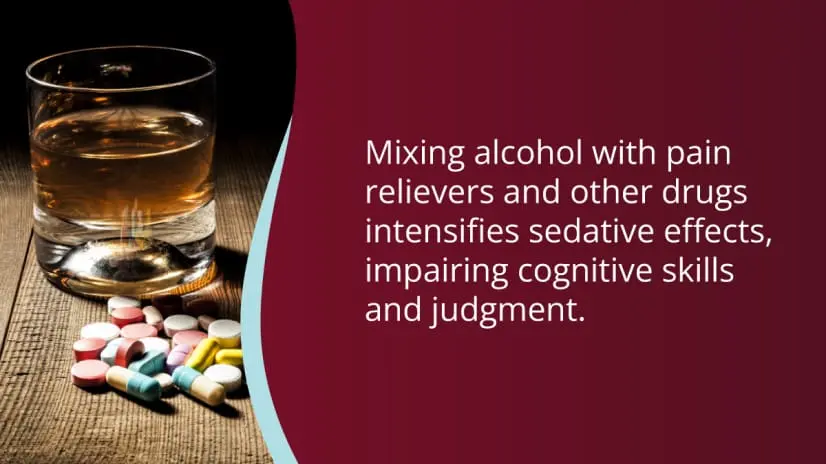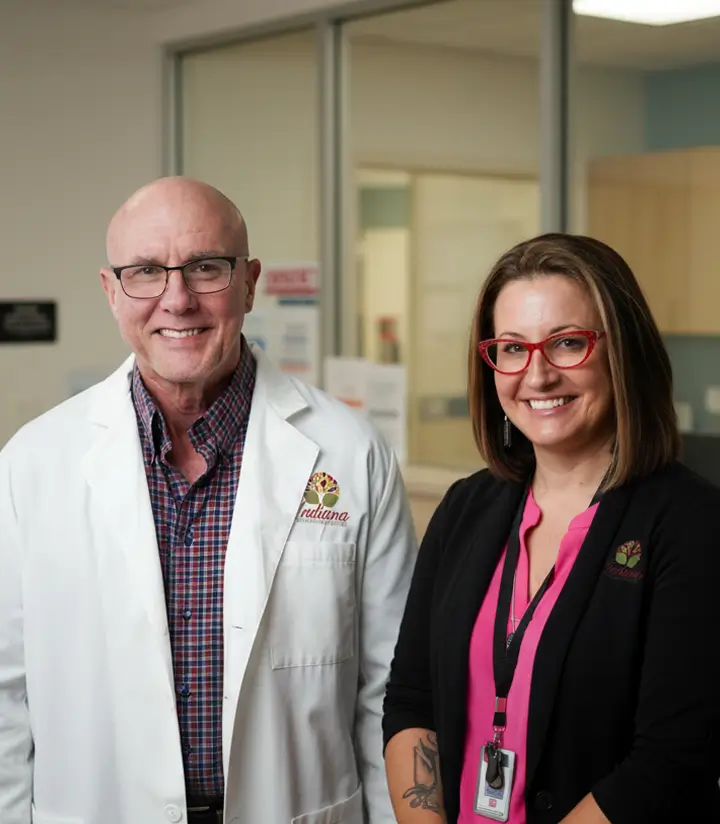
Impact Of Mixing Alcohol With Other Drugs
Clinically Reviewed by:
Combining alcohol with certain medications and illicit drugs can be dangerous, potentially causing liver damage and impacting motor control. Consult a doctor regarding the effects of alcohol when taking prescription drugs to avoid serious consequences.

Key Takeaways
A combination of medications with alcoholic drinks can lead to severe consequences, especially heart problems. Here’s what you need to know:
- Mixing alcohol with pain relievers and other drugs intensifies sedative effects, impairing cognitive skills and judgment.
- Combining alcohol with cocaine or opioids increases the risk of respiratory issues.
- Recognizing signs of drug abuse, such as difficulty breathing, is vital to seek help.
Indiana Center for Recovery stands with you and offers services to help you overcome addiction. Call us today at (844) 650-0064.
Interaction Between Prescriptions And Alcohol
When it comes to alcohol consumption, combining it with other substances can lead to dangerous interactions. Mixing alcohol with prescription drugs, such as antidepressants for depression and anxiety, poses serious risks.
Antidepressants
When it comes to alcohol consumption, combining it with antidepressants, especially those prescribed for depression and anxiety, can lead to severe consequences. The interaction may amplify the effects of both substances, potentially causing heart problems, dizziness, drowsiness, and other adverse reactions. Individuals taking such prescription medications should be cautious about their alcohol use to avoid harmful drug interactions.
Pain Relievers
Over-the-counter drugs, particularly pain relievers such as codeine, can have unexpected interactions when mixed with alcohol. This combination may intensify the sedative effects, impairing motor skills and judgment.
Combining them may also lead to stomach pain, nausea, or vomiting. Individuals must be aware of potential risks and consult with their healthcare providers before consuming alcohol while taking over-the-counter pain medications.
Illicit Drugs
The combination of alcohol with illicit drugs like cocaine, methamphetamine, and opioids is a serious health risk. Stimulants can enhance the effects of alcohol on the central nervous system, leading to depression and paranoia.
Opioids, when mixed with alcohol, may result in respiratory issues, intoxication, and other life-threatening complications. Understanding the dangers associated with this mix is a priority, as it significantly increases the risk of alcohol poisoning and adverse health outcomes.
Side Effects of Alcohol and Drugs
The side effects of alcohol and drugs can lead to serious health consequences. Heavy drinking while taking pills can result in harmful interactions, causing sudden changes in blood pressure and damaging organ systems.
Alcohol, particularly in excess, may compromise the body’s natural defenses, such as the gag reflex, increasing the risk of choking on their vomit. Mixing prescription painkillers with alcohol can damage vital organs, including liver, and may lead to internal bleeding. Understanding the potential harm and being aware of the risks associated with the simultaneous use of alcohol and illegal drugs is crucial.
Recognizing Signs Of Polydrug Abuse
Polydrug abuse refers to the concurrent use of multiple substances, such as drugs or medicines, with alcoholic drinks, often resulting in health problems. Notice the following signs if someone is misusing alcohol with drugs:
- Unpredictable Behavior: Rapid and erratic shifts in mood and behavior may indicate polydrug abuse.
- Physical Health Deterioration: Symptoms like high blood pressure, stomach pain, or chest pain may signal severe internal issues.
- Difficulty Breathing: Labored breathing or respiratory distress is a red flag, especially when associated with certain substances.
- Increased Tolerance: Developing a tolerance to one substance might lead to the use of additional drugs to achieve the desired effects.
- Neglecting Responsibilities: Declining performance at work, school, or home could indicate substance abuse challenges.
- Social Isolation: Withdrawal from friends and family may be a sign of polydrug abuse.
- Drastic Mood Swings: Severe depression or sudden elation can be indicative of substance abuse.
Moreover, mixing prescription medicines, over-the-counter medications, or illicit drugs may result in dangerous interactions, possibly leading to a drug overdose. Recognizing signs of polydrug abuse is essential for early intervention. If someone exhibits these signs, seeking professional help is crucial to address potential health risks and provide necessary support.
Tips To Prevent Alcohol and Drug Abuse
Preventing alcohol and drug abuse is important for staying healthy. Follow your doctor’s instructions carefully when taking medicines to avoid any problems. It’s crucial to educate young adults about the risks of using alcohol and drugs so they can make safe choices.
Avoid mixing substances like energy drinks with alcohol, as this can lead to possible unsafe interactions and increase the risk of overdose. Also, it’s essential to understand the dangers associated with drugs like heroin, which can cause serious effects like coma and changes in body temperature. By staying informed and making wise choices, you can protect yourself and others from the harmful impacts of alcohol and drug misuse.
Finding Support
Rehab programs provide valuable support for individuals seeking recovery from substance abuse. These services aim to address the root causes of addiction and provide necessary support for recovery. With proper care and guidance, you or your loved one can overcome substance abuse and build healthier lives.
Detox is the initial stage of rehab, where the body clears itself of drugs or alcohol. During detox, individuals may experience potential side effects as their bodies adjust to sobriety. Medical supervision helps manage symptoms and reduce risks, especially for those at a higher risk of complications due to liver problems or other health issues.
Rehab facilities offer various levels of care, including residential, outpatient, and transitional programs. Residential treatment facilities provide round-the-clock support and supervision, while outpatient programs allow clients to receive treatment while living in the community. Transitional facilities offer ongoing support as individuals transition back to their communities.
Frequently Asked Questions (FAQ)
Which drugs should you not mix with alcohol?
Mixing alcohol with certain drugs can be dangerous. Avoid combining alcohol with sedatives or anxiety medications, as it can lead to severe side effects and increased risks, such as a higher chance of a heart attack or potential brain damage.
Additionally, it’s important to be cautious with marijuana when consuming alcohol, as the combination may intensify impairments. Always check the medication label for warnings about alcohol mix to ensure your safety and well-being.
How does alcohol interfere with drugs?
Alcohol interferes with drugs by intensifying their effects and creating potential health risks. Combining alcohol with substances like amphetamines or prescription stimulants can be dangerous, as it may lead to an increased risk of overdose.
Alcohol also reduces the efficacy of certain drugs, impacting their intended benefits. Alcohol can also intensify drowsiness and impair motor function when mixed with drugs, affecting cognition processes.
Why should you not mix alcohol?
It’s risky to mix alcohol with prescription opioids or over-the-counter drugs. Combining them can lead to low blood pressure, intensify the drug’s effects, and cause medical emergencies.
Alcohol and certain medications, like painkillers, can both affect your body and brain, increasing the chance of dangerous side effects. It’s safest to avoid alcohol when taking prescribed or over-the-counter drugs to prevent harm and unexpected complications.
Dangerous Drug Interactions? Professional Treatment Can Help
Mixing alcohol with other drugs can have dangerous and potentially life-threatening effects, and if you’re struggling with polydrug abuse, professional treatment can help you overcome addiction and protect your health. At Indiana Center for Recovery, we offer comprehensive addiction treatment programs including medical detox program, intensive inpatient alcohol & drug treatment, and flexible outpatient treatment options.
We offer drug & alcohol treatment centers across Indiana where you can access specialized addiction treatment programs designed to help you overcome polydrug abuse and build a foundation for long-term recovery. Call us today at (844) 650-0064 to learn more about our addiction treatment programs and begin your journey toward a healthier, substance-free life.






 100% Confidential
100% Confidential
